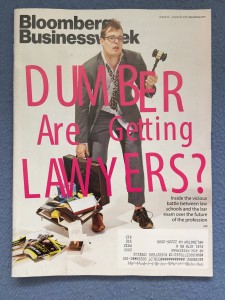It’s rare that the legal market makes the cover of Business Week. The current print issue (24-30 August 2015) cover story asks “Are Lawyers Getting Dumber?”
The article describes the dust-up between lesser-ranked law schools and the National Conference of Bar Examiners (NCBE) over the recent decline in bar passage rates.
For those who believe that status quo law school and the bar exam make sense, this is an important article.
For me, this article misses the bigger, more important points. I question two implicit premises of the status quo:
- That law school prepares law students to practice law.
- That passing the bar exam predicts much beyond ability to pass the exam.
On #1, I have good company judging by the many recent mainstream media and legal publications discussing this question.
On #2, I recognize that passing the bar may relate to law practice ability but am not aware of empirical evidence supporting this notion. Unlike many lawyers, I do not assume that something is right only because we have done it that way a long time. Data trumps supposition, so show me the data.
In my view, we should question the entire regulatory system governing law schools and bar exams. “Question” does not mean abolish. Rather, it means think about what we really are trying to accomplish and whether the mechanisms we have set up align with stated goals. We might find that our goals are misplaced or our mechanisms ineffective. I am not alone in raising this issue. The White House (Department of the Treasury Office of Economic Policy, the Council of Economic Advisers, and the Department of Labor; July 2015) recently released a report, Occupational Licensing: A Framework for Policymakers, that questions professional licensing, at least in some instances.
I fear that this article will, in fueling the fire of the bar passage rate discussions, diminish the public’s share of mind for the far more urgent structural issues of how we train and test lawyers.
Archives
Blog Categories
- Alternative Legal Provider (44)
- Artificial Intelligence (AI) (57)
- Bar Regulation (13)
- Best Practices (39)
- Big Data and Data Science (14)
- Blockchain (10)
- Bloomberg Biz of Law Summit – Live (6)
- Business Intelligence (21)
- Contract Management (21)
- Cool Legal Conferences (13)
- COVID-19 (11)
- Design (5)
- Do Less Law (40)
- eDiscovery and Litigation Support (165)
- Experience Management (12)
- Extranets (11)
- General (194)
- Innovation and Change Management (188)
- Interesting Technology (105)
- Knowledge Management (229)
- Law Department Management (20)
- Law Departments / Client Service (120)
- Law Factory v. Bet the Farm (30)
- Law Firm Service Delivery (128)
- Law Firm Staffing (27)
- Law Libraries (6)
- Legal market survey featured (6)
- Legal Process Improvement (27)
- Legal Project Management (26)
- Legal Secretaries – Their Future (17)
- Legal Tech Start-Ups (18)
- Litigation Finance (5)
- Low Cost Law Firm Centers (22)
- Management and Technology (179)
- Notices re this Blog (10)
- Online Legal Services (64)
- Outsourcing (141)
- Personal Productivity (40)
- Roundup (58)
- Structure of Legal Business (2)
- Supplier News (13)
- Visual Intelligence (14)

